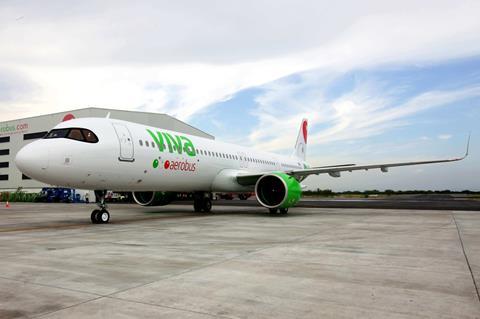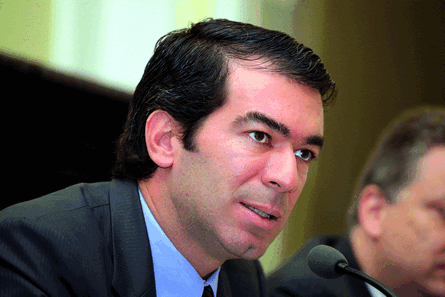Las Vegas-based Allegiant Air and Mexico’s VivaAerobus have asked the US Department of Transportation (DOT) to resume reviewing a proposed alliance between the two ultra-low-cost carriers (ULCC).
The DOT halted that review last year, citing possible violations by Mexico of the US-Mexico air transport agreement.
In a joint filing with the DOT on 23 February, the airlines said approval delays are preventing “the addition of innovative ULCC entry into markets dominated by” mainline carriers American Airlines, United Airlines and Delta Air Lines. Travellers are losing out on new routes and lower fares that Allegiant and Viva plan to add as part of their alliance, they add.
“Facilitating the launch of this first-of-a-kind joint venture between two ultra-low-cost carriers would immediately make travel to many destinations in Mexico far more affordable and efficient, thereby benefiting millions of Americans,” the pair write in their filing.
“Continued delay in this docket prevents innovative entry in a market dominated by legacy carriers American, United and Delta-Aeromexico, benefits those carriers alone, withholds from US consumers the new routes and lower fares the Allegiant-Viva alliance will offer, and thwarts the Open Skies and competition policies of the United States.”

Allegiant and Viva pitched their proposed alliance in December 2021. Mexican authorities approved it in October 2022.
But last July the DOT said it suspended its review on grounds that capacity restrictions at Mexico City’s Benito Juarez International airport may have violated the US-Mexico air transport agreement. Mexican authorities had been attempting to force passenger airlines to move flights to the newer but more-distant Felipe Angeles International airport, which also serves the Mexico City region, by capping aircraft movements and banning cargo carriers from operating at the older airport.
Allegiant and Viva insist the spat should be resolved between the governments, rather than by pulling airlines into the fray.
”The US-Mexico intergovernmental dispute regarding [Benito Juarez airport] access is complex, but the disagreement should be resolved via diplomacy and the dispute resolution mechanism that both governments agreed to bilaterally, rather than withholding [anti-trust immunity] from non-parties to the dispute who are seeking approval for an alliance that is essentially unconnected to the airport at issue,” the carriers write in their filing.
In a 30 August filing with the DOT, Allegiant said the US government was ”intervening on behalf of incumbent oligopolistic network” airlines.
Under their proposed cooperation, Allegiant and Viva intend to operate more than 45 daily flights to 15 Mexican destinations, Allegiant has said. The carriers would focus their partnership on routes to beach and leisure destinations in Mexico. Most of the alliance’s routes would serve Cancun International, Guadalajara International, Los Cabos International, Monterrey International and Puerto Vallarta International airports, Allegiant says, noting that only 6% of routes would involve connections to Mexico City.
Through the joint venture, customers would gain access to each airlines’ loyalty programmes, sales systems and route networks, the airlines say. Allegiant would launch its first flights to Mexico and Monterrey-headquartered Viva would gain access to Allegiant’s extensive US network. Additionally, Allegiant would make a $50 million investment in Viva and gain a seat on the Mexican ULCC’s board.
The airlines had originally planned to kick off the commercial collaboration in the first quarter of 2023.
Last week, Delta and Aeromexico also protested to the DOT after the US authorities last month ruled those carriers must unwind a collaboration in which they had been engaged since 2016, for the same reasons.


























